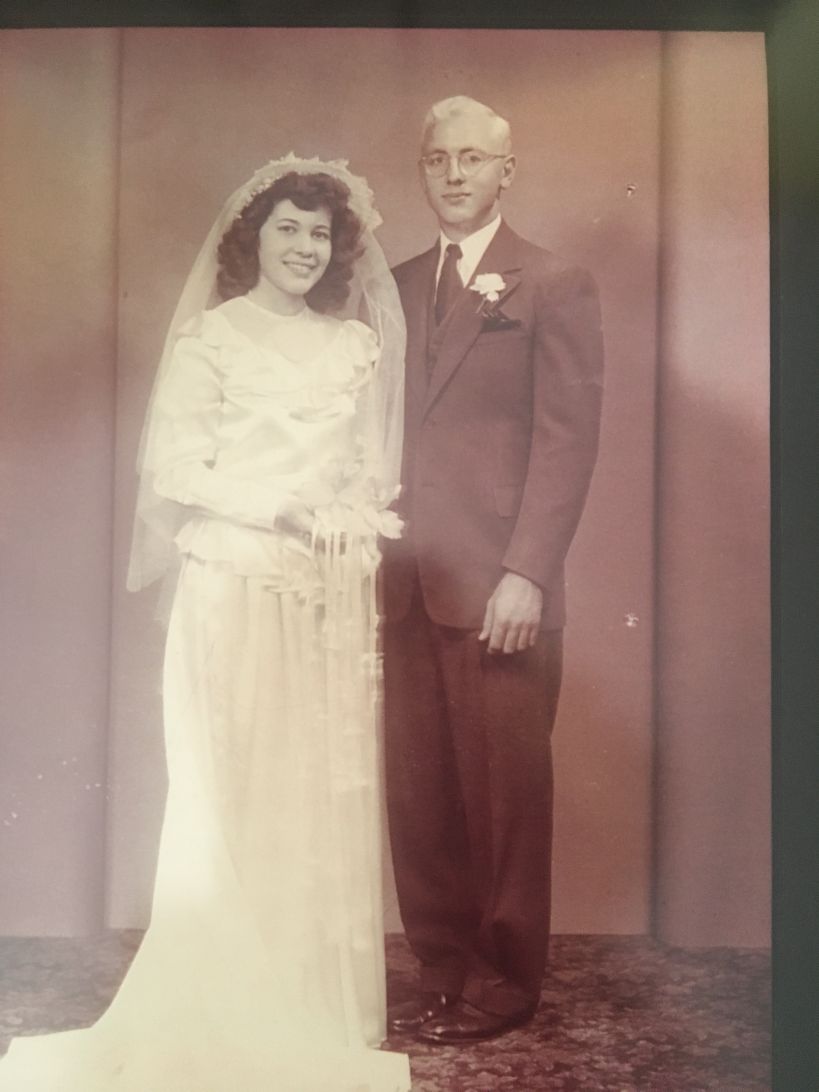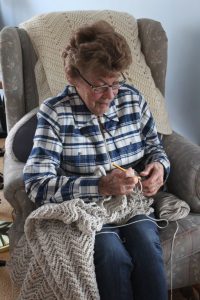
I’m sitting in the the living room of my friends Pete and June days before they celebrate 69 years of marriage, hearing their story. I’ve heard how they were raised in homes where Christ is the center, which is the foundation of their hope.
June and Pete’s childhood families loved not only the Lord but also wrestling. June’s dad took her to wrestling matches at the college from the time she was young, and Pete went to watch his older brothers. She remembers being a senior in high school sitting across from Pete’s family. Her dad pointed out Pete and noted, “He’s a good wrestler. We’re recruiting him.” June hardly noticed him at the time but couldn’t miss his mom, who was a short and stocky woman who swayed so enthusiastically while watching her wrestling sons that she pushed her quiet husband all the way down the bench during the matches. Pete still laughs about it, saying his friends would come not to see wrestling but to watch his mom.
In college Pete and June became friends naturally. Pete was commuting from Maywood each day. June would wait for him after practice, and they’d go to the sweet shop or Cock Robin. During Pete’s sophomore year, they were walking through Memorial Park when he slipped a ring on her finger without saying a word. She didn’t notice it right away and was awfully surprised when she did! He had talked to her dad, who approved of Pete but all four parents were reticent about the couple’s youth. They were only nineteen!
They wed at College Church shortly after Pete’s twentieth birthday, with June still just nineteen years old. Pete moved out to Wheaton to start his junior year and they lived in a big old house owned by a professor named Dr. Straw. June dropped out of school, and a month and a half later they were expecting their first child.
Being young, newly married, and now pregnant wasn’t as atypical as you might think. June recalls that three-quarters of the wrestling team were married at the time, and several of them had kids. None of them had any money so they all helped each other out and had a lot of fun together. Pete and June let one couple from the team move in with them when the trailer they lived in ran out of heat.
Even though they didn’t have a lot of money, they remember those years as happy. Being young didn’t harm them because they didn’t expect a lot, having started life together “on a shoestring”. They are thankful for starting their family early on because now they are able to really enjoy their great grandchildren. Pete and June had four daughters, each two years apart, and then one more seven and a half years later. Though the span is great, all five have a close relationship now.
To provide for his family, Pete taught and coached: P.E., gymnastics, tennis, first aid, and wrestling (there is now a Pete Willson Wrestling Invitational on campus). He also worked at Honey Rock Camp in the summers. He’d walk to the office at 5:30 a.m. so he could be alone and read his Bible. He’s read the Bible through sixty or seventy times: a “Book full of riches” as he describes it.
Earthly riches, though, were never in abundance with this generous couple, yet it didn’t affect their happiness. When their youngest daughter, Debbie, started kindergarten and the older ones were in high school, June knew there wasn’t enough money to get all they needed, so she took a job with excellent benefits at the telephone office. Pete did odd jobs for people whenever he could—painting, drywall, carpentry—in the summers. June says the phone would ring constantly—“Can you come over and change a lightbulb? Or paint? Or fix something?”, and Pete would be right there.
I wonder if the pressures of finances and family weighed on their relationship with each other. So I ask about their marriage of sixty-nine years, what they’ve learned, how they’ve survived. June answers first.
“Knowing that the Lord is first, that He’s the only one that can meet all your needs. We’re human. We don’t always do the things we should. When we got married, there wasn’t a thought in our mind that we’d break up. A commitment, a strong commitment. It never occurred to us to walk away. We were extremely blessed.”
She adds that they grew together—that no one when they got married really knows the other person until after they are married. “You think you do, but you don’t,” she says. And she continues.
“Forget the little things, like how to put a toilet roll on. Those are little issues. Work on big issues…You’re raised in two different families. You’re raised differently. Different ideas about things. You have to give and take. You really do. I don’t like conflict. I hate it. I’ll avoid it as much as I can. Little things, what difference does it make? Let him have it.”
Pete chimes in: “Marriage is about one word: giving. Giving, giving, giving, giving. It has to be that way. If it’s not that way, it’s taking, and that’s what will destroy a marriage… If you would list all the things that she has done, like making a blanket—crocheting a blanket—how many has she passed out? Like eighteen. Giving constantly. Makes us poor, giving to the grandkids and great grandkids” (he chuckles)…“We’re so fortunate to have the family we have. They love the Lord.”

I’m hearing a pattern of community—of expanding family and friendships—and I’m not surprised. They still live that way. They have each other and they lean on the Lord, and these two things give them strength to nourish the lives of many.
Belonging. From the get-go Pete and June welcomed others in and gave out what they had with generosity, building a household of belonging.
I’m anxious to hear more. What does that look like as you approach 90? There’s more to share, coming in Part 3.
Hope and Be.Longing

Leave A Comment